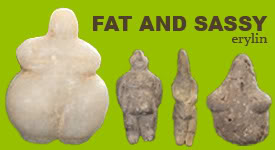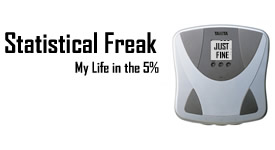Too hot? Blame it on fat!
People who are overweight are at a greater risk for heatstroke, according to FEMA and the Mayo Clinic:
The listing of weight as a risk factor does not bother, or even surprise, me. Fat is an insulator, so people that have more of this insulator will trap more heat than they lose. What caught my eye was the use of the terms “overweight” and “obese.”
Were the BMIs of the subjects for the study (assuming there was one) taken, or was it just assumed that if you looked fat, you were obese? People who appear to be of normal weight, or who have athletic, muscular builds, can register as overweight and obese. Fat people are not always as fat as they look, either. Are normal weight and thin people with muscular statures at the same risk for heatstroke? Muscles generate heat, after all. Could part of the risk factor regarding weight be because of additional muscle that fat people may or may not possess? We do not know this.
I would love to see a study that compared people with obese BMIs in urban vs. non-urban regions. Urban areas, because of the asphalt and concrete so commonly used in these areas, are prone to heat emergencies. Both urban residence and manual labor are listed as risk factors for heat stroke on the FEMA page. Cities have higher concentrations of poor and minority residents, which are statistically more likely to have obese BMIs. Would we see a similar heat stroke risk in fat people from rural or suburban areas? Because poor people are more likely to work menial jobs, could this also explain their higher likelihood of heat stroke if they are the ones disproportionately doing hard labor in extreme heat?
I examined risk factors for hypothermia on the Mayo Clinic site and noticed that thinness is not a risk factor for this condition, even though thin people lack the insulation necessary to forestall extreme cold emergencies. What I did notice, instead, was “poor nutrition.”
Is this their proxy for thinness?
You cannot tell who is starving based on what they weigh or what their body composition is. If poor nutrition really is a risk factor for hypothermia, then fat people would be at additional risk of developing it because most of them will be on low-calories diets at any given time. Everyone’s body functions on a different level of caloric intake, but there is a certain level at which point NO ONE can function long-term. It’s starvation, pure and simple. Basically, people that tell fatties to lose weight are putting them at risk for hypothermia. I doubt any articles would be written about that, though.
Otherwise, being fat (or thin) is largely genetic and may have an evolutionary survival advantage.
Tall, thin bodies theoretically hail from equatorial climates, which makes it likely that shorter and fatter bodies hail from colder climates. Then again, that would turn fat into a potential survival advantage, which is, of course, promoting obesity. It is also a potential explanation for the higher incidence of obesity in various ethnic groups as opposed to the traditional “obesogenic” environment theory.
I don’t think articles that list overweight as a risk factor for heat stroke are fat-hating. Thankfully (can you believe it?) no one is recommending weight loss as a way to reduce your risk of heat stroke! My issue is how they came up with that recommendation and why the implications of thinness or people suffering under-nutrition (fat or thin) are not accurately addressed.
And would it kill them to throw fat people a bone and admit that, yes, fat is genetic and a survival advantage if you live in cold climates?
That’s all. Thank you!























LiveStrong, that bastion of quasi-reliable medical information, has an interesting article on this. They claim that, “According to the Mayo Clinic, ‘Carrying excess weight can affect your body’s ability to regulate its temperature and cause your body to retain more heat.’”
They then quote a phD from the Global Climate Change at CDC’s National Center for Environmental Health, who says that “epidemiologists know that obese people who do not have well functioning cardiovascular systems suffer more from poor thermoregulation… If you’re not able to thermo-regulate well, your chance of experiencing heat exhaustion, which leads to heat stroke, happens at a much faster rate and perhaps at lower temperature.”
The thing he doesn’t say is whether thin people who do not have well functioning cardiovascular systems suffer more from poor thermoregulation. They also tie in heart disease to heat stroke, which makes sense.
On the other side of the coin, it is well-documented that thinness increases the risk for hypothermia in those who are anorexic and the elderly.
Interestingly, in the report on the elderly, they studied three groups, which they identified as “well nourished, thin, and very thin,” then go on to explain that, “The hypothesis that thinness or undernutrition may impair thermoregulation and predispose to hypothermia, lack of coordination, and accident was supported by core temperature measurements on admission: those in most very thin patients were 36°C.”
So your point of “poor nutrition” being a proxy for thinness seems to bear some merit. And as we’ve seen in the past, any story on the health risks associated with thinness come with massive caveats and disclaimers, while any story on the health risks associated with obesity are full-steam ahead.
Also, in one study on hypothermia in divers, the report explains that “thin people cool much more rapidly than fat people in cold water, because even when fully vasoconstricted they have less insulation from subcutaneous fat.”
One last note on heat stroke… that article on Live Strong cites a study that warns of the dangers of heat stroke that should not be ignored, “The study found that 58 percent of patients died within 30 days, and 71 percent died within 2 years of suffering heat stroke. These findings underscore the significant health risk of heat exposure.”
Regardless of the causes of heat stroke, we all have to do our best to avoid it, as it can have long-term ramifications on your health. Thank goodness Fall is coming!
Great post, interesting points!
Peace,
Shannon
I use Livestrong to log my workouts, but Jesus Christ all the articles and other crap they flash in front of you or email you are 100% cringeworthy. Every week is some new superfood or some stupid weight loss article.
Kala,
We just registered for Spark People, which offers the option of selecting a program which focuses on health, rather than weight loss, which is nice. The interface is pretty intuitive and you can track your workouts. It has similar issues with the abundance of cringeworthy articles, but they’re relatively easy to avoid.
Peace,
Shannon
The study also isn’t taking into account the endocrinology of people - that can affect one’s ability to tolerate heat/cold as well. I know that for years, when I lived in Illinois (hot and humid in the summer, cold and humid in the winter), I didn’t tolerate the heat and humidity well at all, but the cold didn’t bother me as much it did other people - not when I was average sized as a kid/young adult, and later as a fat adult. I moved to MN 18 years ago to get away from the humidity in summer (yes, it’s humid here, but not nearly as humid as Illinois, and not for nearly as long). I handle the heat here much better, and for years I hardly ever wore a heavy winter coat in the winter (and Minnesotans thought I was crazy, it’s cold here, doncha know?).
Then I started having issues with my thyroid 5 years ago (it was enlarged, long story short, enough so that I had it removed this month). Now, even with it enlarged, all the tests said my TSH, T3, and T4 levels were within the normal ranges, but i had some of the classic signs of hypothyroidism - cold all the time (even when it was 80 or 90 degrees outside), dry skin, brittle nails, etc. I didn’t tolerate the cold at all, and forget about tolerating air conditioning when it was hot outside. We went to Texas on vacation (San Antonio) the last 2 weeks of June and it didn’t seem hot to me (was in the high 90s). I never broke a sweat the whole time I was there.
My husband, on the other hand, is a furnace. In the winter, he wants the house kept at 65 degrees (summer too). His temp usually runs low, too, around 97.9 to 98.2 (why no one has questioned that a person with type 2 diabetes has a consistently low temperature is beyond me, but that’s another rant for another day). So I wonder if he doesn’t have an endocrine problem too, which makes him intolerant of heat? I know the heat really bothers him in the summer, and he can break a sweat even doing light work around the house without having low blood sugar (and he sweats like a race horse at the end of a long race when his blood sugar goes low).
Why wouldn’t people, especially people in urban/suburban areas have a prevalence of endocrine disorders that haven’t been diagnosed? Look at how many drugs are prescribed today compared to years past, and how many of those drugs that don’t get taken are disposed of into our waste water systems (for years, people were told to flush unused drugs down the toilet), not to mention the wastes from them that we excrete from our bodies into our waste water systems. And our waste water systems are not geared to remove those drugs from our drinking water. Is this a valid concern? I don’t know, but it certainly gives one furiously to think, no?
There are so, so many things they’ve failed to take into account. The things people have already mentioned are certainly likely to be factors, but I suggest that sleep disorders might be another , perhaps small, factor too; many sleep disorders are related to both being fat (something to do with stress hormones correlated with lack of good-quality sleep) and having poor temperature regulation (also caused by lack of good-quality sleep). This is certainly the case with narcolepsy, at least, which I have.
But of course, that’s the story with pretty much every anti-fat study out there, isn’t it? They either ignore real factors in favor of blaming people for fatness, completely overblow the actual data, ignore the population of thin people entirely, or all of the above.
Michael Stipe would disagree that thinness doesn’t predispose one to getting cold more easily. My son and I went to an REM concert about 10 years ago in September and it was very cold and drizzly. Stipe joked that being skinny was great for fitting into crowded elevators but it didn’t do jack for keeping warm in weather like we were having for the concert.
Actually there is evidence that people in lower socioeconomic classes tend to gain weight because of poor nutrition. So, if one is in a lower socioeconomic class, then one will be less likely to have adequate climate control in one’s home. And in the summer if one can’t cool down, one will be more likely to have heat exhaustion issues, regardless of size.
Instead of shaming and blaming, it would be nice if these individuals looked for solutions to improve the quality of people’s lives.